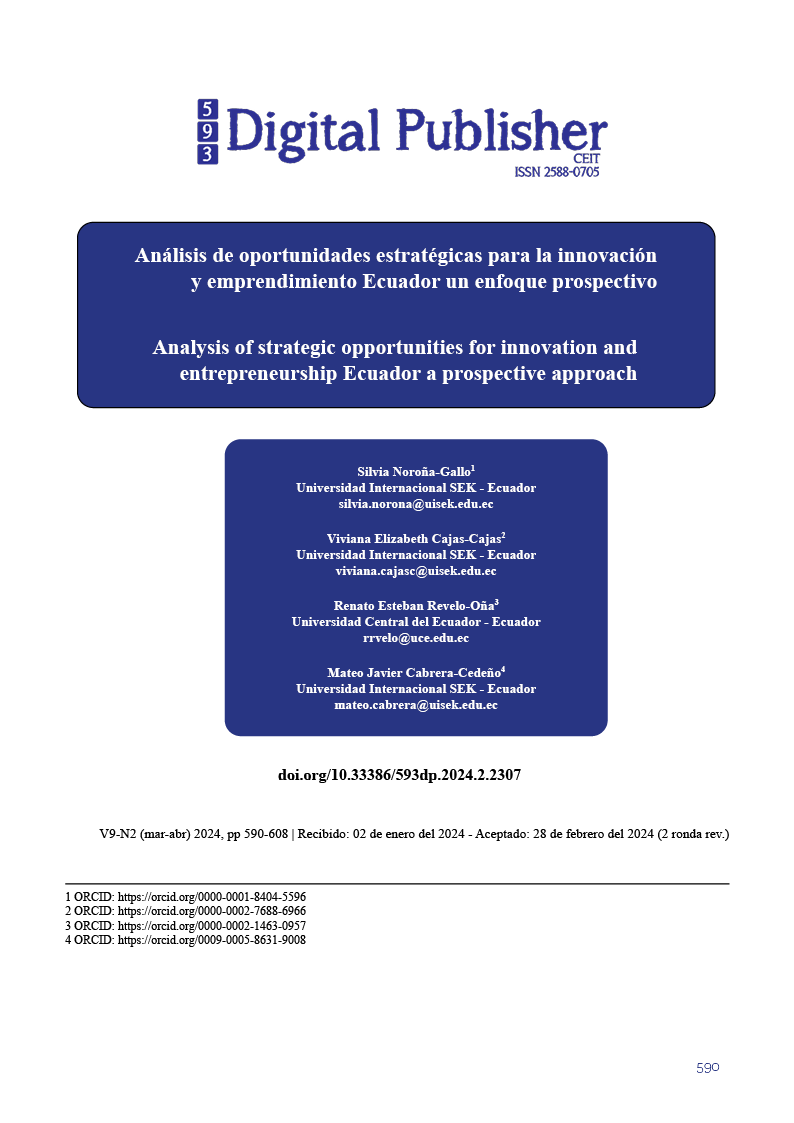Analysis of strategic opportunities for innovation and entrepreneurship Ecuador a prospective approach
Main Article Content
Abstract
This article aims to identify strategic opportunities to boost innovation and entrepreneurship in Ecuador, adopting a prospective approach focused on the Global Innovation Index (GII). The research seeks to comprehensively analyze the GII results for Ecuador, identify areas for improvement, and propose specific strategies to enhance the country's position, thus promoting sustainable business development. The study is descriptive, employing a documentary research modality, through which the conclusion has been reached that implementing comprehensive strategies to strengthen the resilience and competitiveness of the business environment in Ecuador is crucial. This involves identifying key areas for improvement, such as cost reduction, the adoption of emerging technologies, and a review of the tax burden. It also underscores the complexity of the business environment due to challenges related to access to financial resources, bureaucratic procedures, and concerns about security, indicating the need for specific measures to address these obstacles. Furthermore, a detailed analysis of the seven strategic pillars of innovation was conducted, revealing notable improvements in the Ecuadorian institutional environment, especially in political, regulatory, and business aspects. Additionally, strategic opportunities in areas such as research and development, innovation links, and knowledge absorption are highlighted to strengthen the business foundation and foster innovation in the country
Downloads
Article Details

This work is licensed under a Creative Commons Attribution-NonCommercial-ShareAlike 4.0 International License.
1. Derechos de autor
Las obras que se publican en 593 Digital Publisher CEIT están sujetas a los siguientes términos:
1.1. 593 Digital Publisher CEIT, conserva los derechos patrimoniales (copyright) de las obras publicadas, favorece y permite la reutilización de las mismas bajo la licencia Licencia Creative Commons 4.0 de Reconocimiento-NoComercial-CompartirIgual 4.0, por lo cual se pueden copiar, usar, difundir, transmitir y exponer públicamente, siempre que:
1.1.a. Se cite la autoría y fuente original de su publicación (revista, editorial, URL).
1.1.b. No se usen para fines comerciales u onerosos.
1.1.c. Se mencione la existencia y especificaciones de esta licencia de uso.
References
Ács, Z. J., Szerb, L., Lafuente, E., & Márkus, G. (2019). Global Entrepreneurship Index.
Alvarado-Choez, D. I., Barreto-Madrid, R. I., & Baque-Cantos III, M. (2021). Emprendimiento e innovación del sector microempresarial ecuatoriano durante la pandemia covid-19. 56, 2145–2164. https://doi.org/10.23857/pc.v6i3.2497
Araya-Pizarro, S. C., & Araya-Pizarro, C. R. (2020). Factores que influyen en la decisión de estudiar ingeniería comercial según la perspectiva del alumnado de los sistemas público y privado de la Región de Coquimbo, Chile. Formación Universitaria, 13(2), 73–82.
Arévalo-Chávez, P., & Arévalo-Chávez, P. (2015). Emprendimiento de la comunidad colombiana en Ecuador: una aproximación cualitativa. CienciAmérica: Revista de Divulgación Científica de La Universidad Tecnológica Indoamérica, 4(1), 37–46.
Arias Rivera, D. C., & Betancur López, D. (2023). La Globalización y la Empresa Internacional. Dirección de Investigación de La Facultad CEAC.
Bustamante Chong, C., Bustamante Chong, M., Yulan, H., & Zambrano Farias, Z. (n.d.). Estrategia para estimular la innovación en los diferentes tipos de negocios motivación en los negocios. INNOVA Research Journal, 3(10.1), 17–27.
Cajas, V., Ponce, P., & Arteaga, E. (2022). Factores de innovación para fortalecer el emprendimiento en América Latina: un mapeo sistemático. Revista Colombiana de Ciencias Administrativas, 4(2), 58–74.
Casanova Montero, A. R., & Ceniceros González, M. E. (2020). Hacia una estrategia de internacionalización de la economía ecuatoriana 2020-2030. REVISTA CIENTÍFICA ECOCIENCIA, 7(4), 73–95.
Córdova, B., Yagüe Blanco, J. L., Satama, M., & Jara, C. (2020). Identificación de variables que provocan que los graduados agrícolas no regresen al sector rural en el Ecuador. Aplicación de Mapas Cognitivos Difusos. Sostenibilidad, 12(10).
Emprendedores. (2023, August 1). Factores que influyen de forma determinante en el éxito de tu negocio. Emprendedores.
GEM Global. (2023). Global Entrepreneurship Monitor.
Hernández Herrera, C. A., & Sánchez Rodríguez, S. (2017). La educación empresarial: un acercamiento desde los estudiantes universitarios en dos instituciones de educación superior. Innovación Educativa (México, DF), 17(75), 81–102.
INEC. (2022). Registro Estadístico de Empresas (REEM).
INEC Ecuador. (2023). Registro Estadístico de Empresas 2022 Principales Resultados.
Jarrín, J. J., Villalba Gabriela, & Paredes Aguirre, M. (2019). ¿POR QUÉ LAS EMPRESAS ECUATORIANAS INNOVAN? Revista Compendium: Cuadernos de Economía y Administración, 6(1), 15–27.
Jordán, E. D. P. A., Viteri, R. G., Guachilema, T. I. R., & Párraga, V. M. V. (2020). Comportamiento innovador en la Universidad ecuatoriana: un análisis multivariante. Revista Venezolana de Gerencia: RVG, 25(3), 355–367.
Loor Moreira, A. J., Molina Quiroz, C. A., & Baduy Molina, A. L. (2020). Emprendimiento desde la práctica del reciclaje ecológico. CIENCIAMATRIA Revista Interdiscipinaria de Humanidades, Educación, Ciencia y Tecnología, 6(10), 523–535.
Martínez, B. C., González, J. L., Neves, A. R., Ravanos, P., Saisana, M., & Smallenbroek, O. (2023). Joint Research Centre (JRC) statistical audit of the 2023 Global Innovation Index.
Mejía Matute, S., Pinos Luzuriaga, L., Proaño Rivera, B., Tonon Ordóñez Luis, & García Galarza, E. (2020). Entorno Macro Empresarial en el Ecuador.
Ministerio de Producción Comercio Exterior Inversiones y Pesca MPCEIP. (2023). Datos Abiertos.
Ocampo Alvarado, A. M. (2023). Las Nuevas Tendencias en la Gestión Financiera: Análisis Comparativo de Empresas Líderes en Ecuador. Ciencia y Educación, 4(6), 46. https://orcid.org/0000-0002-6114-074X
Organización Internacional del Trabajo. (2021). Evaluación del entorno para el desarrollo de empresas sostenibles en Ecuador 2020-2021.
Parra Angarita, L. C. (2015). Factores Asociados a las Capacidades Organizacionales para la Innovación. Universidad Militar Nueva Granada.
Pérez Quiroz, R. P. , & García Revelo, L. R. (2019). La innovación comercial como factor de influencia en las potencialidades de la provincia del Carchi. Revista Investigium IRE Ciencias Sociales y Humanas, 10(2), 47–64.
Pérez-Campdesuñer, R., García-Vidal, G., Sánchez-Rodríguez, A., Martínez-Vivar, R., de Miguel-Guzmán, M., & Guilarte-Barinaga, E. (2021). Influencia del entorno socioeconómico en el comportamiento de los emprendedores. Casos de cuba y ecuador. Revista Internacional de Gestión Empresarial de Ingeniería. 13.
Pesantez, Z. M. O., & Chiriboga, J. E. B. (2019). Análisis y perspectiva del emprendimiento en el Ecuador. Un Espacio Para La Ciencia, 2(1), 161–174.
Reyes, E. (2022). Metodología de la investigación científica. . Page Publishing Inc.
Rivera, M. E. C., Guerrero, C. A. C., & Pérez, Y. G. (2018). Emprendimientos de mujeres y los entornos virtuales en Ecuador. Espacios, 39(28).
Sánchez Tovar, Y., García Fernández, F., & Mendoza Flores, J. E. (2015). La capacidad de innovación y su relación con el emprendimiento en las regiones de México. Estudios Gerenciales, 31(136), 243–252.
Sánchez, I. K., Ríos, M., Cajas, V. E., & Colcha, O. (2021). Liderazgo positivo en organizaciones saludables. Revista Venezolana de Gerencia, 26(95), 544–563.
Valencia-Arias, J. A., & Marulanda-Valencia, F. Á. (2019). Evolução e tendências de pesquisa em autoeficácia empreendedora: uma análise bibliométrica. Estudios Gerenciales, 35(151), 219–232.
WIPO. (2021). Índice Mundial de Innovación 2021, 14.a edición (14th ed.). Organización Mundial de la Propiedad Intelectual.
WIPO. (2022). Global Innovation Index 2022 What is the future of innovationdriven growth? (B. L. Soumitra Dutta, L. Rivera León, & Sacha Wunsch-Vincent, Eds.; 15th ed.).
WIPO. (2023). Global Innovation Index 2023 Innovation in the face of uncertainty (S. D. Bruno Lanvin, L. Rivera León, & Wunsch-Vincent Sacha, Eds.; 16th ed.).





